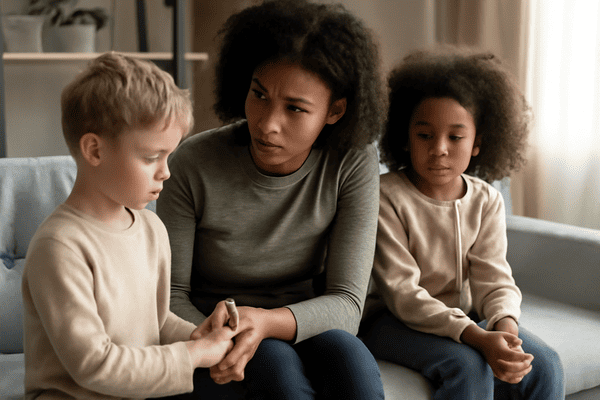Learning how to apologize is more than just saying “I’m sorry.” It’s about teaching children empathy, accountability, and the importance of repairing relationships. These are key social and emotional skills that help kids grow into respectful and compassionate individuals.
As a parent or caregiver, you play a crucial role in helping your child understand not just when to apologize — but how to do it with sincerity and meaning.
Why Apologizing Matters
Apologizing is an important life skill. It teaches children to:
- Take responsibility for their actions
- Understand how their behavior affects others
- Show respect for other people’s feelings
- Rebuild trust and strengthen relationships
When done well, apologies help children feel empowered and more connected to those around them.
Start with Empathy
Before jumping to an apology, help your child understand how their actions made someone else feel.
Ask questions like:
- “How do you think your friend felt when that happened?”
- “Would you feel sad if someone did that to you?”
- “What could you do to make things better?”
This builds emotional awareness and encourages your child to see things from another person’s perspective — the foundation of a sincere apology.
Teach What a Real Apology Sounds Like
Many kids are told to say “sorry,” but they don’t always know what it means. Teach them the key parts of a meaningful apology:
- Acknowledging what happened – “I took your toy without asking.”
- Taking responsibility – “It was wrong, and I shouldn’t have done that.”
- Expressing regret – “I’m sorry I hurt your feelings.”
- Making amends – “Is there something I can do to fix it?”
- Promising to do better – “I’ll ask next time instead.”
These steps help children go beyond words and show real accountability.
Avoid Forcing Apologies in the Heat of the Moment
If a child is upset or angry, they may not be ready to apologize — and that’s okay. A forced apology can feel insincere and unhelpful.
Instead, give them time to calm down and talk things through. You might say:
- “Let’s take a break and talk about it when you’re ready.”
- “We can fix this, but first let’s take a few deep breaths.”
When children feel heard and safe, they’re more likely to reflect and apologize from the heart.
Model Sincere Apologies Yourself
Children learn how to apologize by watching you. If you lose your temper or make a mistake, apologize to your child with honesty:
- “I’m sorry I raised my voice. I was frustrated, but I shouldn’t have yelled.”
- “I made a mistake. Next time, I’ll try to be more patient.”
Modeling sincere apologies teaches children that everyone makes mistakes — and that saying sorry is a sign of strength, not weakness.
Encourage Making Amends
Sometimes an apology isn’t enough. Help your child think of ways to repair the situation:
- Rebuilding a broken tower they knocked over
- Drawing a card to say sorry
- Doing something kind for the hurt person
These actions show that apologies involve responsibility and a desire to make things right.
Praise the Effort to Apologize
When your child takes responsibility and offers a sincere apology, acknowledge it.
Say something like:
- “That was very mature of you to say sorry and try to fix things.”
- “I’m proud of how you handled that.”
Positive reinforcement helps your child feel good about doing the right thing and makes them more likely to repeat it.
Teach Forgiveness Too
Just as it’s important to apologize, it’s also important to teach children how to forgive others.
Explain that forgiving doesn’t mean forgetting or pretending nothing happened, but it means letting go of anger and giving the other person a chance to try again.
Let them see you forgiving others and accepting apologies with kindness.
Keep the Lessons Age-Appropriate
Younger children may only understand basic cause and effect — “I hurt my friend, I say sorry.” Older children can grasp more complex emotions and responsibility.
Adapt your conversations and expectations based on your child’s age and emotional development.
Use simple language and concrete examples for younger kids, and have deeper discussions with older ones.
